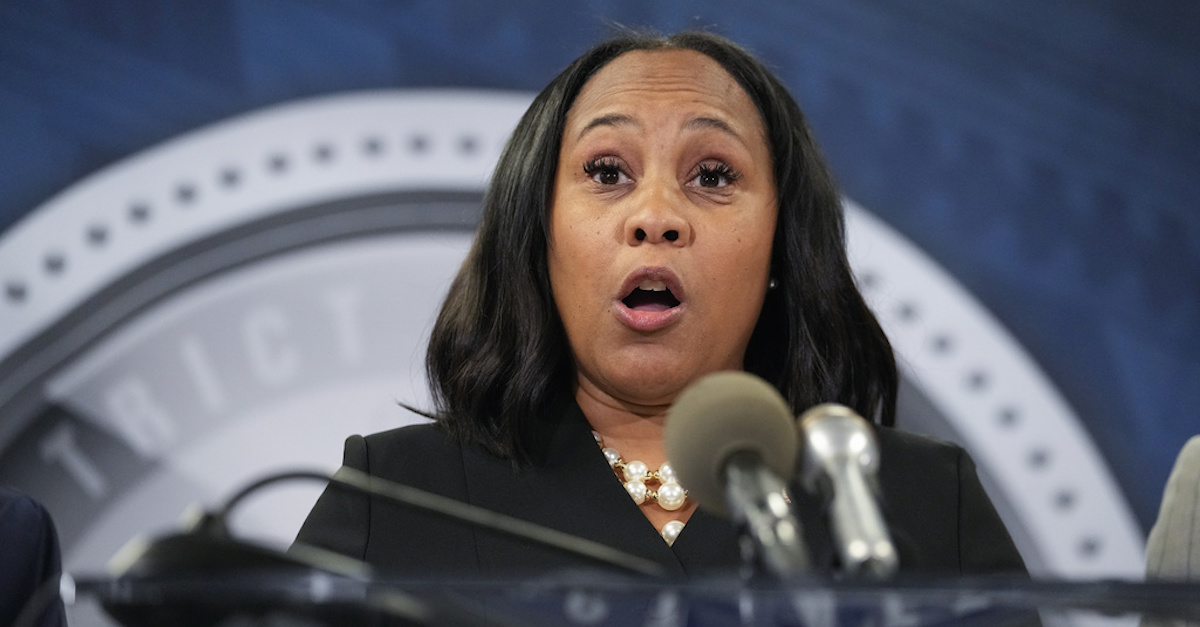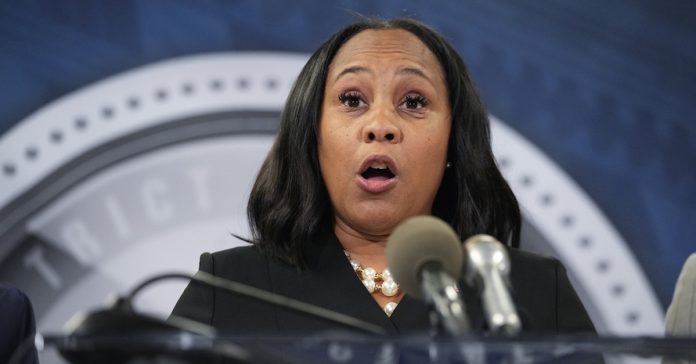
Fulton County District Attorney Fani Willis speaks in the Fulton County Government Center during a news conference, Monday, Aug. 14, 2023, in Atlanta. (AP Photo/John Bazemore)
Adultery and nepotism allegations against Fulton County District Attorney Fani Willis were the unspoken subtext during a Monday hearing with potential implications for former President Donald Trump’s Georgia election interference and racketeering (RICO) case.
In one sense, the case stylized as Wade v. Wade is simply a long-running divorce battle between one of the elected prosecutor’s top deputies, Fulton County Special Prosecutor Nathan Wade, and his estranged (and soon to be ex-) wife, Joycelyn Wade.
In another sense, however, the divorce is a sideline skirmish in the RICO case itself. On Jan. 8, Mrs. Wade filed a subpoena to depose Willis in the divorce matter. On the same day, Michael Roman, a senior staff member for Trump’s 2020 reelection campaign, filed two court motions: one to unseal the Wades’ divorce filings; the other to disqualify Willis and Mr. Wade from the election interference case, alleging a “conflict of interest” among the two state’s lawyers.
In response, Willis’s own attorney filed an emergency motion for a protective order — seeking to quash the deposition request.
During the hearing, both sides scored limited victories.
Roman’s attorney, Ashleigh B. Merchant, started things off by arguing the divorce records had been improperly sealed in violation of a state rule requiring a public court hearing that was not followed.
Mrs. Wade’s attorney, Andrea Hastings, then took the stand to say that her client initially agreed to a consent order that sealed the divorce records based on the information they had at the time.
“We have different information now,” Hastings said — agreeing the records should now be unsealed due to that allegedly new information, left unsaid, and due to the lack of the required hearing.
Mr. Wade’s attorney, Scott Kimbrough, mentioned the initial consent order and argued for the case to remain under seal — but futilely.
In the end, the court ordered the divorce documents be unsealed.
Fulton County Judge Henry Thompson, for his part, framed the remaining divorce issues as relatively simple — little more than a search for the right amount of money for the two parties involved.
“A large portion of what people normally fight over in divorces” was not being disputed, the judge remarked, noting the couple’s children are now adults. Rather, he said, the dispute was about three things: equitable division of the marital estate, alimony, and attorney’s fees.
“The solution will be a number,” Thompson said. “Or three numbers. The numbers will be expressed in dollars and cents.”
And, key to that numerical-monetary inquiry, will be Mr. Wade’s knowledge about the alleged extramarital affair.
Roman previously accused the two prosecutors of having “been engaged in an improper, clandestine personal relationship” throughout the RICO case which allegedly led to both “profiting significantly from this prosecution at the expense of the taxpayers.”
Willis’s attorney, Cinque Axam, argued that, even if his client and Mr. Wade had engaged in an affair, none of the district attorney’s knowledge hinged on the matters before the court. That’s because the issues in a no-fault divorce are all about the Wades’ money.
“Ms. Willis does not share any accounts with him,” Axam said — referring to Mr. Wade. “DA Willis does not determine what he spends his money on, no matter where it comes from.”
In offering this, the district attorney’s counsel reiterated one of the major legal arguments in last week’s motion for a protective order.
“More importantly, District Attorney Willis ‘lacks unique personal knowledge of any matter that is relevant to the subject matter involved in the pending action’ and Defendant Joycelyn Wade has not alleged otherwise,” the motion reads. “Indeed, the deposition of District Attorney Fani T. Willis cannot provide unique personal knowledge of any matter that is relevant to Defendant Wade’s divorce; because on Information and belief, the Plaintiff filed for divorce on November 2, 2021, on the grounds the marriage was irretrievably broken, and on November 30, 2021, the Defendant answered and agreed the marriage was irretrievably broken.”
While Axam steered away from the heart of Roman’s motion to disqualify Willis — the allegations of nepotism self-dealing — he did try to insert the broader case against Trump into the hearing.
This effort recalled the protective order’s argument that Mrs. Wade’s motion to dispose Willis was “conspicuously coordinated with pleadings in the election interference case” and was being “sought in an attempt to harass and damage her professional reputation.”
The judge quickly rebuked this effort, telling Axam instead to focus on the “unique personal knowledge” aspect of the law. The judge later told Mrs. Wade’s attorney not to refer to that argument either.
“I don’t really want to hear that today,” Thompson said.
Mrs. Wade’s attorney later focused on the monetary aspects of the divorce — and sought to directly implicate Willis there.
“I want to know about how he’s been spending his money,” Hastings argued. “I have a reason to believe he’s spending it on another woman. That’s my client’s money. And I want to ask questions about that. She’s trying to hide under the shield of her position.”
Ultimately, the court determined both sides had offered good arguments late morning and early afternoon on Monday.
“Irretrievably broken does not prohibit you from presenting evidence of adultery if that’s relevant to equitable division of the marital estate or marital assets,” Thompson said, agreeing with Hastings, in part, and refusing to issue Willis’s requested protective order.
But the judge said he also agreed with Axam that Willis herself may not have much of anything to offer that Mr. Wade does not have.
“It seems to me that Mr. Wade would be the first and best source of information on what his income has been and how he has been spending it,” Thompson said. “And that he would have firsthand knowledge of whether he has engaged in an extramarital affair.”
The judge ruled only after Mr. Wade testified would the court be able to determine if the requested Willis deposition was necessary — due to the “unique knowledge” requirement in Peach State family law.
“Unique being the key word there,” Thompson opined.
In the end, the deposition was not quashed but it was stayed, pending the results of Mr. Wade’s own testimony in an evidentiary hearing.
Have a tip we should know? [email protected]

